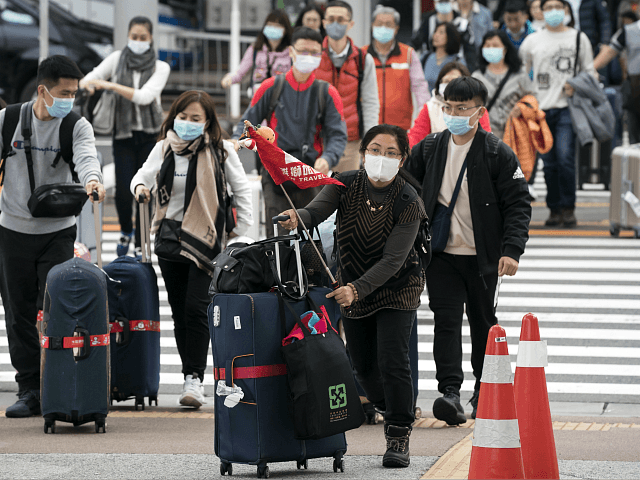The Chinese Foreign Ministry expressed appreciation on Monday that the United Nations voted to add Lunar New Year to its “floating holiday” calendar, hoping to “celebrate with the world” in February.
The upcoming Lunar New Year is expected to begin on February 10, 2024, and mark the Year of the Dragon in Chinese tradition. It is typically the most widely celebrated holiday in the year in China outside of mandatory festivities in October to mark the founding of the Communist Party. China is far from the only nation to mark the turning of the lunar calendar, however; versions of the celebration take places throughout southern Asia.
The Lunar New Year is also one of China’s busiest travel seasons of the year. The 2024 holiday will mark the fourth anniversary of the initial mass travel out of Wuhan, China, in early 2020 that resulted in what was then a localized outbreak of a novel coronavirus becoming a pandemic responsible for the deaths of an estimated 7 million people and counting.
In January 2020, despite abundant evidence of an infectious respiratory disease spreading in the central Chinese city, authorities claimed that the novel coronavirus was not transmissible from person to person and did not deter the departure of 5 million people from the metropolis to destinations around the world. The city also attempted to break the record for the world’s largest banquet, inviting 130,000 people to share food family-style in an indoor, highly contagious setting.
The context of Lunar New Year preceding the traumatic spread of the Wuhan coronavirus did not surface in joyful statements from the Chinese Foreign Ministry on Monday about celebrating the holiday with the rest of the world through the United Nations system.
“The Lunar New Year symbolizes joy, harmony, and peace and its Chinese name ‘Spring Festival’ conveys the greetings and warmth of the spring season,” Chinese Foreign Ministry spokeswoman Mao Ning said on Monday, responding to a question about the U.N. adding the holiday to its “floating holiday” calendar.
“The festival embodies the core values of harmony, love and peace in Chinese culture. We look forward to celebrating the Spring Festival with the world,” Mao continued, “and hope all civilizations will live in harmony, prosper together and engage in exchanges and mutual learning.”
Mao added that the Communist Party hoped “people of all countries will enjoy better mutual understanding and friendship and work together for building a community with a shared future for mankind.”
“Community with a shared future” is a phrase often employed by Chinese dictator Xi Jinping to refer to his vision of Chinese-led globalism, in which Communist Party orthodoxy overrides the sovereignty of individual states and dilutes local cultures.
Mao conceded that China is one of nearly 20 countries that recognizes the Lunar New Year as a public holiday, despite it often being referred to as “Chinese New Year,” and described it as “a global cultural event, bringing joy to people around the world.”
The “floating holiday” designation essentially urges United Nations officials to schedule events around the date to avoid forcing employees to work on those days. As the U.N. includes representatives of nearly every country on earth – with the notable exception of Taiwan, a country that celebrates Lunar New Year – the “floating” allows for the United Nations not to entirely shut down on those days for those who do not observe the holidays.
The U.N. General Assembly recognized the Lunar New Year on Friday. Chinese propaganda outlets celebrated the decision as a victory for the Communist Party’s “Global Civilization Initiative, a vague plan announced in March allegedly meant to promote “diversity” and “tolerance” of other cultures. China is currently engaging in a full-scale genocide of Uyghur and other Turkic communities in occupied East Turkistan, which it administers under the Han name “Xinjiang Uyghur Autonomous Region.”
“The resolution serves as a showcase of the influence of Chinese civilization and aims to enhance interactions between diverse civilizations worldwide,” the state-run China Daily declared on Saturday, citing a Chinese U.N. official. “It also reflects the values of diversity and inclusion promoted by the United Nations.”
The Lunar New Year marked the initial spread of Wuhan coronavirus out of that city in early 2020. Chinese authorities in the area responded to initial evidence of an outbreak in the city by repressing the evidence, “disinfecting” – removing the evidence of disease – at a “wet market” accused of being a node of infection and silencing doctors urging hand-washing and the use of sanitary masks. Meanwhile, local authorities held a massive Lunar New Year lunch banquet estimated to attract 130,000 people, many of them elderly “empty nest” couples whose children could not return for the holiday.
The 2020 Lunar New Year ushered in the Year of the Rat.
“The reason why the Baibuting community continued to host the Banquet this year was based on the previous judgment that the spread of the epidemic was limited to humans, so there was not enough warning,” Wuhan Mayor Zhou Xianwang said at the time.
The World Health Organization announced on January 14, 2020, “preliminary investigations conducted by the Chinese authorities have found no clear evidence of human-to-human transmission of the novel coronavirus … identified in Wuhan.”
At a press conference shortly thereafter, Mayor Zhou Xianwang announced that 5 million of the 11 million people in Wuhan had left the city for the Lunar New Year holiday before the Communist Party imposed a repressive mass lockdown on those remaining, an indication the lockdown did little to prevent the global spread of the virus. Zhou offered to resign if the Communist Party deemed it necessary, but also gave himself an 80 (out of 100) when asked to grade his performance regarding the local outbreak.
Zhou is currently a lawmaker with the Communist Party’s Chinese People’s Political Consultative Conference (CPPCC), one of two federal-level lawmaking bodies.
Follow Frances Martel on Facebook and Twitter.

COMMENTS
Please let us know if you're having issues with commenting.